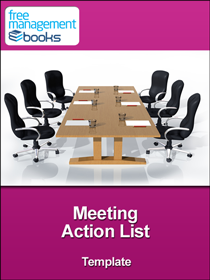Meeting Action List Template
 |
||
 |
||
This Meeting Action List template enables you to record actions, responsibilities and timescales that result from the meeting.
Meetings can take up a lot of a manager's time. Therefore, it is imperative that he/she be able to achieved the desired outcome from each meeting, whether ad-hoc or formal. To be able to do so, the manager needs to have the right set of skills and the aptitude to be an effective chair at the meetings. Only then will you be able to ensure the meeting stays on track from start to finish and doesn't end up being a waste of time.
![]()
![]()
So, what are the required skills and aptitude a manager must have to chair a meeting effectively? Here are a few of the most important ones.
Agenda Preparation
At the outset, you need to outline the agenda for the meeting. The agenda should describe the meeting's purpose and what you want to achieve through it. This is something important that you need to focus on. Most of the time, managers are more than happy to use meetings as a sounding board for the ideas they have for their business and seek advice and guidance from their advisors and employees. Idea generation is important no doubt, but will that result in something tangible?
Even before you get to the meeting, you should work on the agenda and fine-tune it to make sure it doesn't have any irrelevant points. Only genuine concerns and issues your business is facing should be addressed at the meeting. Often, it is after setting the agenda that you can decide on the meeting's participants. Also, you need to set a realistic timeframe for the meeting. You cannot just keep on going for hours on end.
Conflict Management
Once you have completed your meeting's agenda, you need to think about how the people invited to the meeting are going to respond to it. A meeting may have a high-pressure atmosphere not everyone is equipped to deal with. There may be some participants who disagree with what you have to say. An effective chair should be able to predict such reactions. This is why pragmatic deliberation is crucial when deciding on the participants of the meeting.
You need to be able to project all realistic outcomes of the meeting, particularly if the purpose of the meeting is negotiation or settling a conflict. For constructive meetings, conflict can actually lead to better ideas being brought to the table. To be an effective chair, you should be able to determine when to encourage debate and when to clear the air right away.
Leadership Skills
In your capacity as a chair, you have to assert yourself as the leader. The participants should look up to you as the head of the meeting, not just a part of it. This is extremely important for keeping the meeting focused on the agenda at hand. Often when managers don't show leadership at a meeting, one of the other participants may step in to fill the void. Given that you are the person in charge, you have to prevent such a situation from arising.
Not only do you need to hold back detractors, but also encourage participation from all those present. Only with consensus can the meeting reach a positive conclusion and achieve the outcome you were aiming for. You have to walk a fine line between being the leader of the meeting and still giving others a chance to voice their opinions.
Final Analysis
Reviewing the meeting right after it has been concluded can prevent any important points from being overlooked. This is where you need to assess the mood of the situation. Not all meetings can be perfect. The chair has to determine whether or not the environment is conducive to an immediate thorough analysis. If not, you can ask for feedback and carry out your analysis after ending the meeting. But if the meeting has gone well, you should not delay the analysis.
This allows you to note down all the points agreed upon by participants. You can decide, along with the participants the actionable steps that need to be taken for the points to be implemented. Rather than putting it off, it is better to get this done right after the meeting.
You may also be interested in: Chairing a Meeting, The Skills Required, The Importance of Meeting Rules, Duties of the Chair Before the Meeting, Duties of the Chair at the Beginning of the Meeting, Duties of the Chair During the Meeting and Duties of the Chair After the Meeting.


